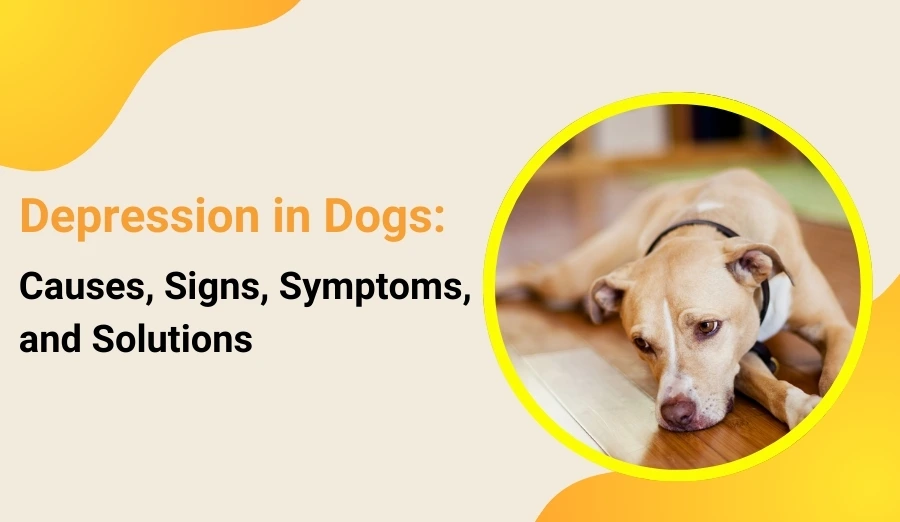-
Kutchina service center, Kolkata - 700010
Kutchina service center, Kolkata - 700010

Hello Reader!
Welcome to the blog page of APC Pet Clinic, one of the best pet clinic in Kolkata.
Just like humans, dogs can experience emotional distress, and depression in dogs is a real concern for pet owners. When a dog’s mood changes drastically, it can impact their overall well-being, behavior, and even physical health. Understanding the causes, recognizing the symptoms, and knowing the right solutions can help pet parents provide the best care. At APC Pet Clinic, one of the best pet clinics in Kolkata, we offer expert guidance on diagnosing and managing dog’s depression effectively.

Several factors can lead to depression in dogs, including:
Dogs form strong bonds with their owners and fellow pets. The loss of a loved one can trigger sadness and lethargy in dogs.
Moving to a new home, a change in family structure, or even a shift in daily routine can lead to dog’s depression.
Dogs are social animals. Prolonged isolation or lack of interaction with their owners can lead to loneliness and depression.
Certain medical conditions like chronic pain, hormonal imbalances, or neurological disorders can contribute to depression in dogs.
Rescue dogs or those with a history of neglect or abuse may be more prone to developing dog’s depression.
Identifying depression in dogs early can help in implementing effective interventions. Some common symptoms include:

At APC Pet Clinic, one of the best pet clinics in Kolkata, we believe that timely intervention can greatly improve a dog’s emotional health. Here are some effective solutions:
Spending quality time with your dog, offering cuddles, and playing can make a significant difference.
Daily walks, playtime, and mental stimulation through toys and puzzles can help boost their mood.
Encourage interaction with other dogs and new people to prevent loneliness.
Maintaining a consistent daily schedule for feeding, walks, and playtime can provide a sense of security.
If the symptoms persist, consulting a veterinarian at APC Pet Clinic, one of the best pet clinics in Kolkata, is recommended. Sometimes, medical intervention or therapy may be necessary.

Helping your dog cope with the loss of a companion can be a challenging yet essential process. Just like humans, dogs experience grief and may show signs of depression or anxiety following the death of a fellow pet. Here are some effective strategies to support your dog during this difficult time:
Allow your dog to process their emotions at their own pace. Grieving is a natural process that can take time, and it’s important not to rush them into activities they may not be ready for. Pay attention to their body language; some dogs may seek comfort and closeness, while others might prefer solitude.
Keeping a consistent daily schedule for feeding, walks, and playtime can provide your dog with a sense of stability and security. A predictable routine helps them understand that life continues despite the loss, reducing anxiety and stress.
Familiar scents can be soothing for grieving dogs. Consider keeping a blanket or toy that carries the scent of their lost companion. This may help ease their sense of loss and provide reassurance during this transitional period.
Spend extra time with your dog by engaging in activities they enjoy, such as playing fetch or going for walks. Offering more affection, cuddles, and attention can help them feel loved and supported as they navigate their grief.
Engaging your dog in mentally stimulating activities can help distract them from their sadness. Puzzle toys, training exercises, or new games can keep their mind active and provide a positive outlet for their energy.
Taking your dog outdoors can relieve stress for both you and your pet. Fresh air, new sights, and sounds can stimulate their senses and help lift their spirits. Try visiting familiar parks or exploring new areas together.
Keep an eye on your dog’s behavior for any signs of prolonged grief or distress, such as loss of appetite, excessive whining, or destructive behaviors. If these symptoms persist, consider consulting your veterinarian for guidance or referral to a qualified behaviorist.
If appropriate, allow your dog to have a moment with the body of their deceased companion. Smelling the body may help them understand the situation better and facilitate the grieving process.
While it may be tempting to get another pet to fill the void left by the lost companion, it’s crucial to give your dog time to grieve first. Introducing a new pet too soon can add stress during an already challenging time.
If your dog’s grief seems overwhelming or prolonged, consult with your veterinarian about possible behavioral therapies or medications that could assist in managing their emotional state.
Also Read: Essential Guide to Proactive & Preventative Pet Care

Depression in dogs is a serious condition that can significantly affect their quality of life. Understanding the most effective treatments for dog depression is essential for pet owners seeking to help their furry companions. Here’s a comprehensive overview of the treatments available, combining behavioral interventions and medical options.
Behavioral modifications are often the first step in treating depression in dogs. These strategies can help improve your dog’s mood and overall well-being:
Creating a stimulating environment can significantly impact your dog’s mood:
If behavioral modifications are insufficient, medical treatments may be necessary:
If you suspect your dog is suffering from depression, it’s crucial to consult with a veterinarian or a veterinary behaviorist. They can help identify underlying medical issues that may be contributing to your dog’s condition and recommend appropriate treatment plans tailored to your pet’s specific needs.

Yes, certain dog breeds are more prone to depression due to a combination of genetic factors, temperament, and environmental needs. Understanding these predispositions can help pet owners take proactive steps to ensure their dogs remain happy and healthy. Here are some breeds commonly associated with higher susceptibility to depression:
While certain breeds may be more susceptible to depression, several factors can contribute to this condition:

To prevent depression in dogs, various lifestyle changes can be implemented that promote mental and physical well-being. Here are some effective strategies to help keep your furry friend happy and healthy:
Engaging your dog in regular physical activity is one of the most effective ways to prevent depression. Daily walks, runs, or play sessions not only keep your dog fit but also release endorphins that enhance mood. Aim for at least 30 minutes of exercise each day, adjusting the intensity based on your dog’s breed and age. Activities like fetching, agility training, or swimming can provide great physical and mental stimulation.
Just as physical exercise is vital, mental stimulation is equally important for preventing boredom and depression in dogs. Incorporate puzzle toys, interactive games, and training exercises into your dog’s routine. Teaching new tricks or commands can also engage their mind and strengthen the bond between you and your pet.
Dogs are social animals that thrive on interaction with humans and other pets. Regular socialization helps prevent feelings of isolation and loneliness, which can lead to depression. Arrange playdates with other dogs, visit dog parks, or simply spend time with family members to ensure your dog feels connected and engaged.
Dogs benefit from having a consistent daily routine that includes feeding, exercise, playtime, and rest. A structured schedule provides a sense of security for your dog and helps reduce anxiety. This predictability can be particularly beneficial during times of change or stress.
Ensure that your dog has a safe and comfortable space where they can relax. A cozy bed in a quiet area of the house can help them feel secure. Additionally, providing toys and items that stimulate their senses can enhance their environment.
Encourage positive behaviors by rewarding your dog with treats, praise, or playtime when they exhibit happy or engaged behavior. This reinforcement helps them associate good feelings with activities that promote their well-being.
Be mindful of major life changes that could affect your dog’s emotional state, such as moving to a new home or the loss of a family member. If you anticipate stressful events, prepare your dog by maintaining their routine as much as possible and providing extra comfort during transitions.
Routine veterinary check-ups are essential for identifying any underlying health issues that could contribute to depression in dogs. Regular health assessments can help catch problems early on, ensuring your pet remains physically healthy and emotionally balanced.
If you notice signs of depression in your dog despite implementing these lifestyle changes, consider consulting a veterinarian or a certified animal behaviorist. They can provide tailored advice and may recommend additional interventions if necessary.

Depression in dogs can be caused by the loss of a companion, environmental changes, lack of social interaction, underlying health issues, or past trauma.
Symptoms include loss of appetite, lethargy, excessive sleeping, withdrawal, destructive behavior, and unusual vocalization.
Yes, by providing extra attention, regular exercise, social interaction, and maintaining a consistent routine.
If symptoms persist for more than two weeks or worsen, consult a veterinarian for professional evaluation and treatment.
Yes, chronic pain, neurological disorders, or hormonal imbalances can contribute to depression in dogs and require veterinary attention.
Recognizing and addressing dog’s depression is crucial for their overall health and happiness. By understanding the causes, monitoring symptoms, and implementing solutions, pet owners can ensure their furry friends lead a joyful and fulfilling life. If your dog is showing signs of depression, visit APC Pet Clinic, where our experts can provide professional advice and treatment tailored to your pet’s needs.
For consultations and expert pet care, reach out to APC Pet Clinic today. Because every pet deserves to be happy and healthy!